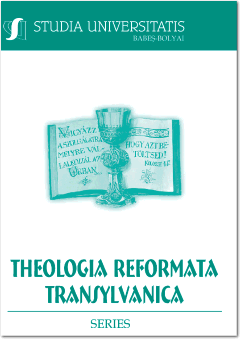THE MISSION OF CHRISTIANS FOR RECONCILIATION IN EUROPE
THE MISSION OF CHRISTIANS FOR RECONCILIATION IN EUROPE
Author(s): Dieter BrandesSubject(s): History of Church(es), Biblical studies, Systematic Theology, Pastoral Theology
Published by: Studia Universitatis Babes-Bolyai
Keywords: Reconciliation; Healing of Memories; Historical wounds; Genocide; Charta Oecumenica;
Summary/Abstract: The old historical wounds of Europe are century-old wounds like the “Northern Ireland conflict”, the Russia–Finland conflict, the Poland–Germany–Russia conflict, the long-lasting conflict between Ottomans, Hungary, and later, the Habsburg and the Russian Empire, but also the thousand-year-old religious borderline between Eastern and Western culture. Moreover, the first half of the 20th century in (the Christian) Europe is characterized by wars and genocide in a terrible, hitherto unknown dimension. About 10 million people died in World War I and about 50 million in World War II.Countries all over Europe like Austria, Belgium, Croatia, Czechoslovakia, Denmark, Finland, France, Great Britain, Germany, Greece, Hungary, Ireland, Italy, Netherlands, Norway, Poland, Romania, Russia, Serbia, Turkey, and Ukraine were involved in these war-related events. Many unhealed mental wounds are still deeply rooted in the hearts of individuals and peoples. Unhealed wounds also remained concerning the genocides of the 20th century, like the Armenian genocide, the Holodomor in Ukraine, the Holocaust against Jews and Gypsies, the genocide against Tatars in the Crimean region. Finally, let us remember the million fold wounds that arose from the communist dictatorships. After World War II, we have to mention the wounds inflicted by many additional European conflicts like the ones between Azerbaijan and Armenia, Georgia and Russia, Ukraine and Russia, the Bosnia–Croatia–Serbia conflict regarding the dissolution of the old state of Yugoslavia, the conflict between Greeks and Turks regarding Northern Cyprus, the Moldova–Russia conflict regarding Transdniestria etc. “The need for healing and reconciliation in our broken world cannot be overemphasized. The pain and burden of memories of ongoing, recent and past conflicts haunt and hamper normal life and progress. The process for ‘Healing of Memories’ is designed to advocate for, develop and promote healing of memories and other healing and reconciliation processes in Churches and faith communities, so as to strengthen their role as channels of hope, healing and reconciliation in our world today.” This was part of the final message of the WCC “European Ecumenical and Interreligious Consultation on ´Healing of Memories’ on 4th-6th May 2010”, in Sarajevo, Bosnia-Herzegovina.On the one hand, the Bible leads us to peace and reconciliation, like in Prov 16:7 in the Old Testament: “When a man’s ways are pleasing to the Lord, he makes even his enemies to be at peace with him”, or in the new Testament, when in Cor 5:18, Paul says “All this is from God, who through Christ reconciled us to himself and gave us the ministry of reconciliation.”Moreover, the European Protestant, Orthodox, Anglican, and Catholic churches avowed in the Final Document of the Second European Ecumenical Assembly in Graz 1997: “The church communities must confess that throughout history they often showed themselves as a bad example for the Christian message of reconciliation and ´religions and churches became themselves part of the problem´.” Therefore, the European churches signed in their common Charta Oecumenica in chapter 3: “In the spirit of the Gospel, we must reappraise together the history of the Christian churches, which has been marked by many beneficial experiences, but also by schisms, hostilities and even armed conflicts.”There have been several church initiatives of reconciliation in Europe, like the Stuttgart Church Confession of Guilt, the reconciliation process between the Polish Ecumenical Council and the Evangelical Church in Germany, the Czechian and German church reconciliation process, the reconciliation process between the Church of Norway and the Sámi, the reconciliation process in Northern Ireland, the process called „Reconciliation in Europe between the Churches in Ukraine, Belarus, Poland, and Germany”, the Anglican–Orthodox Dialog, the Porvoo process between the Anglican and the Lutheran Churches, the Pro Oriente reconciliation process regarding the schism of the “Unions of Brest and Transylvania”.The “Healing of Memories” (HoM) process – originally developed in South Africa as a counselling methodology for the healing of personal emotional wounds after the apartheid – was further developed in South Eastern Europe on behalf of CPCE, CEC, and WCC into a process between cultures and religions.Healing of Memories between cultures and religions is a methodology to help overcome frozen history and “hi-stories” by putting emphasis on voices that were not heard, ignored or not acknowledged so far. According to its methodology, HoM is a “process of the generations” that implicates the three steps of “walking together through history”, “sharing the pain of others”, and “preparing the future together”. The HoM process between cultures and religions adds to the above “three historical steps” the previous step: “Interdisciplinary researching of the history of the nations, cultures and religions and/or communities.”For these HoM processes, special training courses have been developed in Romania in order to train facilitators, which have been recognised and adopted in the meantime as master courses at the universities of Cluj-Napoca/Kolozsvár, Alba Iulia/Gyulafehérvár, and Sibiu/Nagyszeben.
Journal: Studia Universitatis Babeș - Bolyai Theologia Reformata Transylvanica
- Issue Year: 65/2020
- Issue No: 1
- Page Range: 309-344
- Page Count: 36
- Language: English

